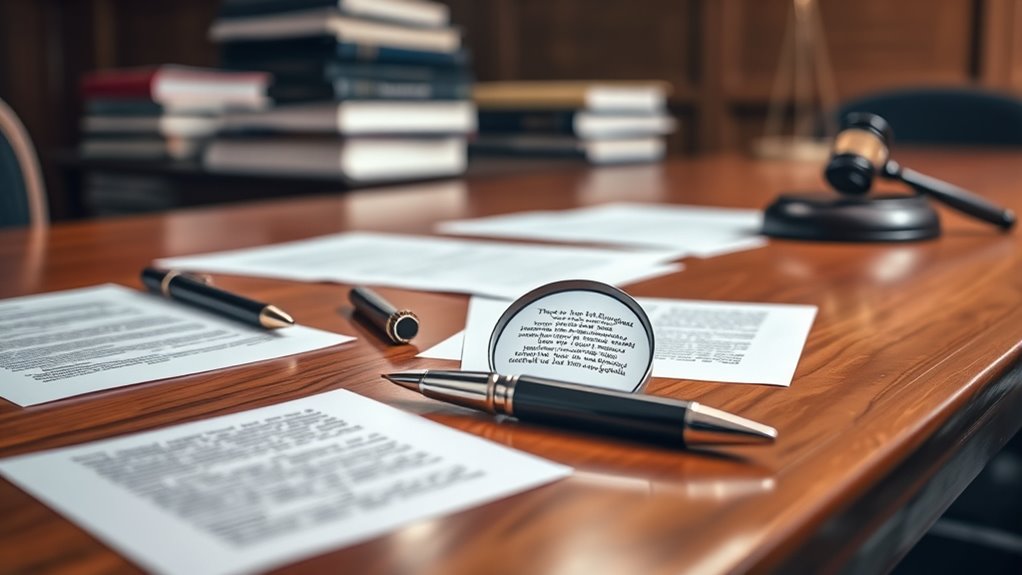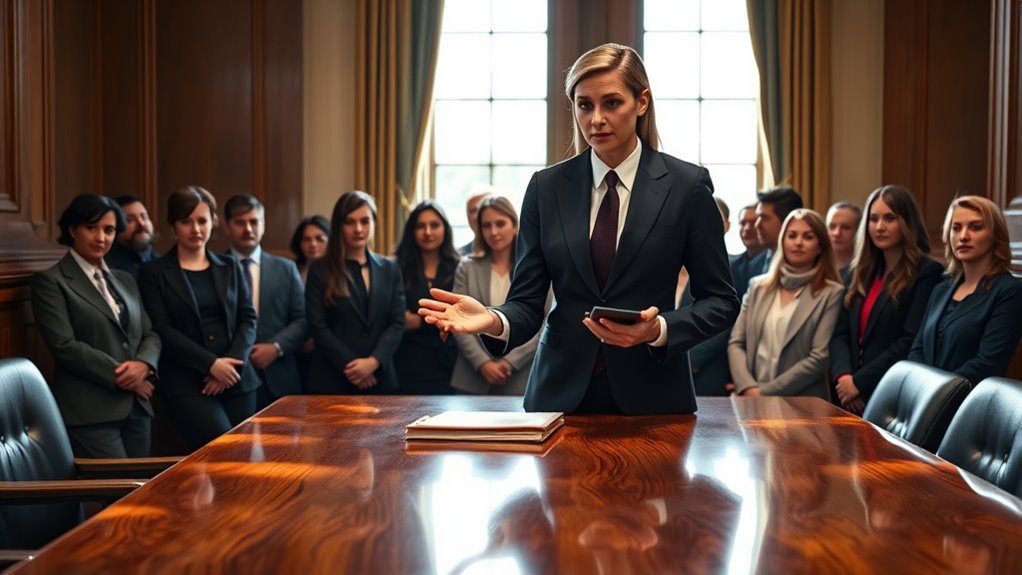To win arguments like a lawyer, focus on precise language that clarifies your points and avoids misunderstandings. Ask strategic questions to uncover facts and evidence that support your case. Know when to argue and when to listen, recognizing emotional cues that influence the flow. Avoid fallacies and frame your arguments with compelling stories and empathy. Stay calm under pressure to project confidence. Mastering these principles can elevate your persuasive skills—continue exploring to access more winning strategies.
Key Takeaways
- Use precise, clear language to strengthen your arguments and prevent misunderstandings.
- Ask targeted questions to uncover hidden facts and gather compelling evidence.
- Recognize when to listen or assert, leveraging emotional cues for strategic advantage.
- Frame arguments with storytelling and empathy to connect emotionally and persuade effectively.
- Maintain composure under pressure to think strategically and present yourself confidently.
The Power of Precise Language

Because every word in a legal context carries weight, using precise language is essential for clarity and effectiveness. Legal jargon helps you communicate complex ideas succinctly, but it also demands careful tone regulation to avoid misunderstandings. When you choose your words carefully, you ensure your message is unambiguous and authoritative. Precision minimizes the risk of misinterpretation, which could weaken your position or lead to unfavorable outcomes. Tone regulation through exact language demonstrates professionalism and control, reinforcing your credibility. Remember, in the courtroom or negotiations, every word counts. Mastering the power of precise language allows you to craft compelling arguments and navigate legal discussions with confidence. Additionally, understanding key traits of successful communicators can further enhance your ability to persuade and defend your position effectively. Ultimately, clarity and accuracy in your language are your strongest tools for winning arguments.
The Art of Asking the Right Questions

Asking the right questions helps you uncover vital facts that others might overlook. Precise inquiries guide the conversation and keep it focused on what truly matters. When you craft your questions carefully, you can reveal hidden details that shape the case. Incorporating innovative solutions into your questioning strategy can also provide fresh perspectives and insights.
Crafting Precise Inquiries
Crafting precise inquiries is essential for uncovering the truth and guiding a case effectively. When you develop clear, targeted questions, you can extract valuable information and avoid confusion. Studying case studies helps you understand how specific questions shape outcomes, while referencing legal precedents ensures your inquiries align with established legal principles. Precise questions limit ambiguity, forcing witnesses or opponents to provide straightforward answers. This sharp focus can reveal inconsistencies or strengthen your position. Remember, well-crafted inquiries don’t just gather facts—they steer the case in your favor. Practice formulating questions that are direct, relevant, and rooted in evidence. Additionally, understanding the importance of security measures can help tailor questions to uncover vulnerabilities or strengths in a case. By doing so, you maximize your chances of winning arguments and uncovering the truth efficiently.
Uncovering Hidden Facts
Mastering the art of asking the right questions can uncover hidden facts that might otherwise stay concealed. By paying attention to hidden clues and covert hints, you can reveal information that the other person may not intend to share outright. Ask open-ended questions that encourage elaboration, and listen carefully for subtle cues in their responses. Sometimes, a simple follow-up can lead to a breakthrough, exposing details lurking beneath the surface. Be observant of body language, tone, and pauses—they often carry covert hints that complement verbal answers. Effective questioning requires curiosity and patience, allowing you to piece together facts that seem insignificant but are vital to the full story. This approach transforms a straightforward inquiry into a powerful tool for uncovering the truth.
The Importance of Evidence and Proof

Evidence and proof are the foundation of any strong legal case, because without them, your arguments lack credibility and weight. To build a convincing case, you must focus on evidence evaluation—carefully examining each piece for authenticity and relevance. Effective proof presentation is equally critical; how you organize and display your evidence can sway a judge or jury. Clear, logical connections between your evidence and your claims make your arguments more persuasive. Remember, strong evidence doesn’t just support your position—it establishes it as credible and undeniable. Without solid evidence, even the most compelling theories fall apart. Additionally, understanding the role of contrast ratio in projectors can help you present visual evidence more effectively in court settings. By mastering evidence evaluation and proof presentation, you ensure your arguments stand firm and win the trust of those making the final decision.
Knowing When to Argue and When to Listen

You need to recognize what triggers an argument and when it’s better to listen. By reading between the lines, you can understand underlying concerns and avoid unnecessary conflicts. Prioritizing active listening helps you decide whether to argue or simply absorb the information. Employing persuasive language can also influence the tone of the conversation and guide it towards constructive outcomes.
Recognize Argument Triggers
Recognizing argument triggers is essential because they signal the right moments to engage or hold back. Emotional appeals often serve as strong triggers, revealing when someone’s feelings are influencing the conversation. When you notice these, it’s a cue to decide whether to address the emotional aspect or to steer back to facts. Rhetorical devices like questions, repetition, or emphasis can also trigger arguments, highlighting when someone is trying to persuade or provoke a response. By spotting these cues early, you can choose to listen carefully or respond strategically. Understanding these triggers helps you avoid unnecessary conflicts and seize opportunities to strengthen your position. Recognizing when emotions or rhetorical devices surface ensures you control the flow of the argument rather than reacting impulsively. Additionally, being aware of dog names and their significance can provide insight into personality traits that influence how someone argues or responds in discussions.
Read Between Lines
Understanding when to argue and when to listen is key to effective communication. Pay attention to metaphorical language, as it reveals underlying feelings and intentions beyond words. When someone uses vivid imagery or symbolic phrases, they’re often expressing emotional appeals that deserve acknowledgment rather than challenge. Recognizing these cues helps you decide whether to respond with logical counterpoints or simply listen. Sometimes, the true message is hidden beneath the surface, requiring you to read between the lines. By tuning into emotional appeals and subtle hints, you can gauge when to hold back and when to engage. This awareness allows you to navigate conversations smoothly, building rapport and avoiding unnecessary conflict. Additionally, being aware of the interpretation of prophetic dreams can help you better understand underlying messages in communication. Mastering this skill makes you a more perceptive and strategic communicator.
Prioritize Active Listening
Effective communication hinges on knowing when to listen and when to argue. Active engagement and attentive listening are key to understanding the full picture. When you genuinely listen, you gather valuable insights and demonstrate respect, which can defuse tension and build trust. Recognize moments when silence or listening is more powerful than immediate rebuttal. By focusing on the speaker’s words and emotions, you spot opportunities to respond thoughtfully rather than react impulsively. Knowing when to listen allows you to prioritize clarity and understanding, giving you a strategic edge. Additionally, understanding essential oils for effective relief can help manage stress and maintain composure during tense negotiations. Remember, effective argumentation isn’t about dominating; it’s about knowing when to absorb information and when to assert your point. Mastering this balance makes your communication more persuasive and impactful.
The Role of Logical Fallacies to Avoid

Why do logical fallacies matter in legal reasoning? Because they weaken your arguments and can mislead judges or juries. Emotional appeals might sway opinions temporarily but lack logical grounding, risking credibility. Strawman fallacies are particularly harmful—they distort your opponent’s position, making it easier to attack a weaker version rather than the actual argument. Recognizing these fallacies helps you stay focused on facts and logic, ensuring your reasoning remains solid. Avoiding emotional appeals that manipulate feelings and strawman fallacies keeps your case honest and persuasive. When you identify and eliminate these errors, you strengthen your credibility and ensure your arguments are built on sound logic, making your case more compelling and harder to refute.
Framing Your Argument for Maximum Impact

Have you ever considered how the way you present your argument can influence its persuasiveness? Framing your argument effectively means using persuasive storytelling and emotional appeals to connect with your audience. Instead of just listing facts, craft a narrative that highlights the stakes and resonates emotionally. For example, framing a case around fairness or injustice can evoke empathy and strengthen your position. Use vivid language and relatable scenarios to make your point memorable. Remember, how you frame your message can shape perceptions and sway opinions, so choose your words carefully. By emphasizing key themes and appealing to emotions, you create a compelling context that increases your chances of winning the argument. Mastering framing transforms facts into powerful persuasion tools. Incorporating ethical considerations into your framing ensures your argument remains trustworthy and responsible.
The Value of Empathy in Persuasion

Did you realize that genuine empathy can be a powerful tool in persuasion? When you show emotional intelligence, you connect more deeply with your audience or clients. Building client rapport isn’t just about facts; it’s about understanding their feelings, concerns, and perspectives. Empathy allows you to tailor your message in a way that resonates personally, making your arguments more compelling. By genuinely listening and validating their emotions, you create trust and openness. This emotional connection makes it easier to influence their decisions because they feel understood and respected. In legal persuasion, empathy isn’t a sign of weakness; it’s a strategic advantage that helps you craft arguments that speak directly to your listener’s core beliefs and values. Recognizing the importance of emotional depth can significantly enhance your persuasive abilities.
Staying Calm and Composed Under Pressure

Remaining calm and composed under pressure is essential in legal persuasion because it allows you to think clearly and respond effectively, even in tense situations. Building emotional resilience helps you manage stress and maintain focus when stakes are high. Mental discipline enables you to control your reactions, preventing frustration or anxiety from clouding your judgment. When you stay steady, you project confidence, which influences judges and juries. Practice deep breathing, stay present, and remind yourself of your preparation. Remember, your ability to remain composed under pressure often wins arguments more than the words you choose. By cultivating emotional resilience and mental discipline, you turn challenging moments into opportunities to demonstrate your professionalism and command the courtroom.
Frequently Asked Questions
How Do Legal Professionals Develop Their Persuasive Speaking Style?
You develop your persuasive speaking style by mastering legal storytelling and using effective rhetorical devices. Practice crafting compelling narratives that connect emotionally and logically with your audience. Incorporate techniques like repetition, analogies, and strategic pauses to emphasize key points. By honing these skills, you’ll become more convincing, engaging, and memorable in court, ultimately winning your arguments through clear, impactful communication that resonates with judges and juries alike.
What Are Common Mistakes to Avoid in Courtroom Rhetoric?
Think of courtroom rhetoric as a delicate dance—you don’t want to stumble over your words. Avoid rhetorical fallacies that can trip you up, and focus on clear, honest arguments. Don’t overpromise or manipulate; instead, aim to build trust and connect with the jury. Remember, persuasion isn’t about loudness but about clarity and integrity, helping you win jury persuasion without falling into common pitfalls.
How Can Emotional Intelligence Influence Legal Argumentation?
You can strengthen your legal argumentation by developing emotional intelligence, especially empathy and emotional awareness. When you understand your clients’ and jurors’ feelings, you craft more compelling stories and connect better. By recognizing emotional cues, you can tailor your rhetoric to resonate deeply, making your arguments more persuasive. This empathetic approach helps you build trust, influence perceptions, and ultimately, win cases with a nuanced and human touch.
What Role Does Body Language Play in Persuasive Communication?
Imagine your words are the ship, but body language is the wind steering it. Nonverbal cues like facial expressions and gestures can dramatically sway your message’s course. When you maintain eye contact and use open gestures, you build trust and credibility. Conversely, crossed arms or avoiding eye contact can create barriers. Mastering these cues helps you persuade more effectively, making your message resonate deeply with your audience.
How Do Cultural Differences Impact Legal Argument Strategies?
When considering how cultural differences impact legal argument strategies, you see that cultural nuances shape how messages are received and interpreted. In cross-cultural persuasion, you must adapt your approach to align with diverse values, communication styles, and norms. Recognizing these differences allows you to craft compelling arguments that resonate across cultures, increasing your chances of success. You adjust your language, tone, and evidence to effectively bridge cultural gaps in legal contexts.
Conclusion
By mastering these legal strategies, you can become a more persuasive and confident communicator. Remember, clear language, strong evidence, and genuine empathy often win over even the toughest skeptics. Knowing when to listen and when to assert your point makes all the difference. So, next time you face a challenge, ask yourself: are you using your words as effectively as a seasoned lawyer? With practice, you’ll turn arguments into victories.
Joy, as our Editor in Chief, ensures the highest standard of content. Her talent in writing is complemented by her attention to detail and passion for literature and culture. Joy’s expertise and love for the English language shine through in her editorial work, making each piece a testament to quality and clarity.










